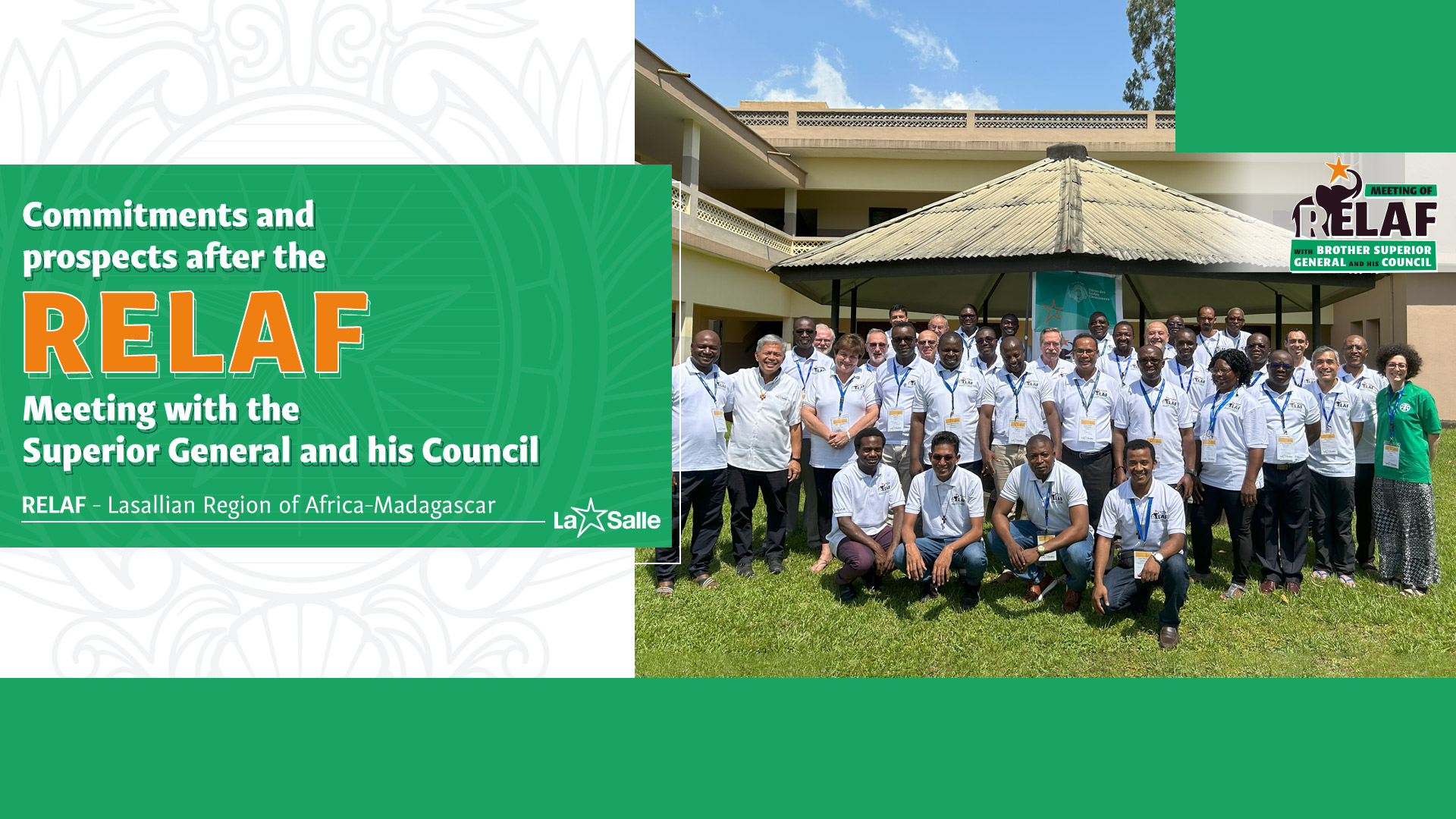“We have come to share stories with you in the shade of the Baobab, the tree of life; we recognise the heroic audacity of the pioneer missionaries who left their comfort zones to come to these lands; we have drunk from the fountain of their wisdom and we celebrate the Lasallian legacy that continues to build the Reign of God here and now“. With these words Brother Armin Luistro, Superior General of the Brothers of the Christian Schools, closed the meeting with the Lasallian Region of Africa-Madagascar (RELAF) held in Abidjan (Ivory Coast) from 13 to 17 November, with the participation of the Brother Visitors, Auxiliary Visitors, Bursars and those responsible for the Lasallian Educational Mission of the five Districts and the Delegation which are part of the Region, together with the members of the General Council of the Institute, who also took part in it.
“There are no superiors or inferiors: we are all brothers and children of the same Father,” Brother Armin continued, affirming that “under the shade of the Baobab we have a safe space to dare to ask the challenging questions: have our schools contributed to improving the lives of young people in our Region? Are we repeating the mistakes of the past, or creating a new vision of a world where justice and peace reign?”.
Rethinking our formation
In summing up and taking up the commitments arising from the Meeting, Brother Rodrigue Taoppen, Visitor of the District of West Africa (DILAO), appreciated the fact that Brother Superior General and his Council “have travelled around Africa to see at first hand our own realities”.
With regard to the formation of the Brothers, Lay Partners and Young Lasallians, he asked himself, “Does the formation we provide young people really enable them to transform Africa? This is a question we must ask ourselves in order to rethink our formation, so that we can emerge from underdevelopment, or from the poverty in which we have been ourselves for so many years”, he affirmed.
Where are your brother and sister?
For his part, Brother Julien Tarsimbazafy, Visitor of the District of Madagascar, hopes “for collaboration with the Institute to develop our Region,” while at the same time he considers it necessary to take up, in his District, the main issues that were discussed.
“Brother Superior General gave us a strong message: we need to go beyond, to the peripheries. Where is your brother, where is your sister?“, underlined Brother Julien.
Sustaining the ministries
For Brother Betre Fisseha, Visitor of the Lwanga District, the challenges arising from this Meeting should be taken up by the District Chapter: “specifically the Leavening Project as an important element that came out very strong for us to consider“.
Another of the aspects to be considered, together with the need to guarantee a solid terciary level education preparation for the Brothers and Lasallian Partners, is the sustainability of the ministries, since “we have to think of the future of all”.
Transforming reality
Regarding the commitments resulting from the Meeting, Brother Emmanuel Mboua, Visitor of the District of Central Africa considers that “we need to place much more emphasis on the training to be given to our Lay Partners”. Recognising the important role of Lay Partners in the Lasallian Educational Mission, Brother Emmanuel stated that one of his priorities would be “to sensitise all the Brothers so that they take on board this reality of the Institute, which is also that of the Church”.
Likewise, the metaphor of ‘Moses and the burning bush’, proposed by Brother Superior General as an invitation to “remove all obstacles that can prevent us from being in touch with reality”, also translates into a renewed commitment to “the Leavening Project, which calls on us to do something to change the situation in the world”.
Caring for the common home
From the perspective of Brother Pie Nsukula, Visitor of the District of Congo-Kinshasa, Brother Superior General’s interventions are striking, first around the ‘burning bush’, and then in relation to the Baobab tree, “making the connection with nature”, and recalling that “with the encyclical Laudato Si’ Pope Francis is inviting all humanity to look after nature, which is our common home“.
“In Africa, the Baobab tree represents a very important tree: it is the ‘palaver tree’, it is where people go when they have problems, it is where they go to sort out their problems,” Brother Pie recalled, insisting on the importance of recognising that “we are all sons and daughters of the same Father who is God and, as we are all brothers, under the shade of the tree we must settle all our disputes”.
Overcoming poverty through education
Finally, Brother Jean Bosco Bigirimana, President of the Delegation of Rwanda highlighted that “education provides solutions to the various forms of poverty that young people and children experience” in the Region, as one of the most significant intuitions of the Meeting, based on the recognition of other realities and in connection with other Regions of the Institute.
“From our own realities we have much to do”, Br Jean Bosco adds, convinced that it is urgent “to realise what is being done at our level, and to check whether what we are doing is helping young people and children to escape poverty”.



